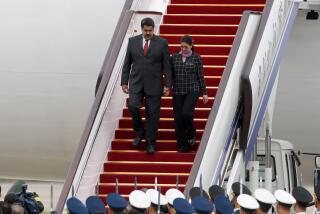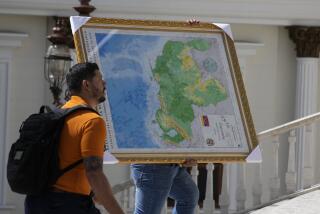Sandinista Officer Defects to Honduras in Helicopter
- Share via
MANAGUA, Nicaragua — A Sandinista air force captain defected to Honduras on Wednesday in a Soviet-made MI-25 helicopter gunship, the most valuable aircraft in the Sandinista arsenal.
U.S. officials said the windfall could yield useful intelligence about the Sandinista air force and the state of its Soviet-supplied helicopter fleet. The pilot and his craft are in the custody of the Honduran armed forces, which have close ties to the United States.
It was the first Soviet-made helicopter spirited out of Nicaragua. The Soviet Union began supplying MI-17 and MI-25 helicopters to the Sandinistas in 1984 to combat the U.S.-backed Contras.
The Nicaraguan Defense Ministry issued a brief communique saying the helicopter had been “abducted” by Capt. Edwin Estrada Leiva “on orientations of the Central Intelligence Agency.” It branded him “a CIA terrorist.”
The Foreign Ministry asked Honduras for the “immediate return” of the aircraft. Honduras reported the defector’s arrival but did not reply to Nicaragua.
A Sandinista official said Estrada, apparently flying solo, left the main Sandinista air base in Managua around dawn. Officials in Honduras said he was intercepted by radar near the border and escorted by two Honduran F-5 air force jets to a military base adjacent to Toncontin airport in Tegucigalpa, the Honduran capital.
U.S. officials declined to say whether they had seen the defector or his helicopter, but they assumed that access would be given.
The MI-25, which is described as a “flying tank,” can go as fast as 200 m.p.h., according to the Pentagon. It is armed with 57-millimeter rockets and 23-millimeter guns with which to attack ground troops.
“It isn’t so much the machine that’s significant, but you can learn all kinds of things when you get your hands on it,” said a U.S. army official. For example, he said, the Pentagon could learn how well the Sandinista gunships are maintained.
Nicaraguan Foreign Minister Miguel D’Escoto called the pilot’s defection “a criminal act, a crude maneuver by the CIA.” He said the pilot could be used to portray the Sandinistas as “potential aggressors,” giving Washington arguments to justify a military invasion of Nicaragua.
In a note to the Honduran government, D’Escoto said Nicaragua will seek the pilot’s extradition as well the return of the aircraft.
But army Col. Efrain Gonzalez, the honduran amassador here, said the two countries do not have an extradition treaty.
Times staff writer Melissa Healy, in Washington, also contributed to this article.
More to Read
Sign up for Essential California
The most important California stories and recommendations in your inbox every morning.
You may occasionally receive promotional content from the Los Angeles Times.













